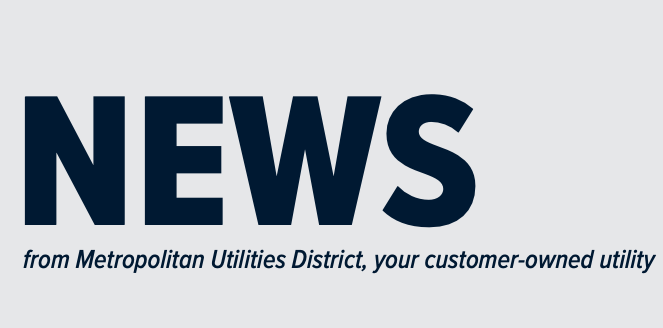October 2020 Bill Insert: Prepare for Heating Season

CORONAVIRUS RELIEF PROGRAMS OFFER UTILITY BILL ASSISTANCE
For many in the community, COVID-19 is causing financial hardships due to job losses, furloughs, reduced hours and other situations. People are making decisions on how to pay ongoing living expenses, including utilities. There are several assistance programs that can help – even if customers do not have past due balances.
Residents can apply for up to $750 toward their gas and water utility bills through the Coronavirus Aid, Relief and Economic Security (CARES) Act. There are no income guidelines – only that household income has been negatively impacted by the pandemic.
For more information or to apply, visit mudomaha.com/covid19relief. Customers who need help through the application process may contact a partnering agency via the website or by calling 1.888.650.9132 to hear a list of the agencies. If you do not meet the eligibility guidelines for CARES Act assistance and need help, please visit our website for more information about state assistance and the M.U.D. Home Fund.
PREPARE FOR HEATING SEASON
With the arrival of colder weather, make sure your heating and ventilation systems are in proper working order. Schedule a furnace inspection and tune-up with a qualified heating and cooling contractor to maintain a safe and efficient system. Other tips:
• Use a clean furnace filter. Standard air filters usually need to be cleaned or changed once a month. Check the owner’s manual.
• If a pilot light or burner flame goes out, allow ample time for any gas accumulation to escape before relighting. If the problem continues, call M.U.D. at 402.554.6666, or your heating contractor.
• Gas appliances need fresh air for proper combustion. Combustion products need to be vented to the outdoors. Keep flues, ducts and vents attached to appliances and heating systems in good condition and clear of obstructions.
BILLING AGENT OF SEWER, TRASH FEES FOR EFFICIENCIES
Did you know? Each municipality or sewer jurisdiction sets their rates and fees. Sewer charges on your M.U.D. bill are calculated based on the rates designated by the sewer provider for your address. Municipalities include: Bellevue, Bennington, Gretna, La Vista, Omaha (including the unincorporated portion of Douglas County), Ralston and Sarpy County.
M.U.D. is the billing agent that invoices and collects sewer use (and some trash) fees and remits them back to the municipalities.
Combined invoicing provides more efficient service to sewer users and M.U.D. customers by avoiding unnecessary billings and postage costs.
For more information, visit mudomaha.com and search How to Read My Bill.
If you suspect CO, call 911
CARBON MONOXIDE AWARENESS
Carbon monoxide (CO) is a gas that can be produced by incomplete combustion when carbon-based materials — wood, propane, charcoal, natural gas, oil, gasoline and kerosene — are burned. CO has no odor or color. To prevent CO, have a licensed heating contractor inspect your heating system and appliances every year. CO symptoms are flu-like: Headaches, dizziness, vomiting or nausea, weakness and tightness of the chest. Be suspicious if all members of your family share the same symptoms and the symptoms clear up when you’re outside the house. If symptoms persist, see a doctor.
IF YOU SUSPECT CO:
• Check to see if anyone is experiencing symptoms of carbon monoxide. If anyone is overcome by CO, call 911.
• Do not panic. Get everyone out of the building.
• Get help for anyone in need of medical care.
• Check for a vehicle or small engine operating in an attached garage or basement.
• Open doors and windows to let in fresh air.
• Turn the thermostat to the lowest setting.
• Turn off all unvented appliances (range, auxiliary heater).
• Turn the water heater to the lowest setting.
• Check flues for obstructions.
• Check for soot around the water heater and furnace.
• If you are unable to determine the cause, call a licensed heating contractor or our emergency number, 402.554.7777.
Gas safety information provided in a second language as required by the U.S. Department of Transportation Code 49.
CONCIENCIA DEL MONÓXIDO DE CARBONO
El monóxido de carbono (CO) es un gas que puede ser producido por combustión incompleta cuando materiales basados con carbón— madera, el propano, el carbón, el gas natural, el petróleo, la gasolina y el queroseno — son quemados. CO no tiene olor ni color. Para prevenir CO que un contratista licenciado de calefacciones verifique el sistema de calefacción su aparatos deben ser inspeccionados todos los años.
Síntomas son parecidos a la gripe: Los dolores de cabeza, el mareo, vomitando o la náusea, la debilidad y la estrechez del pecho. Sea sospechoso si todos los miembros de su familia comparten los mismos síntomas y los síntomas aclaran cuando estén fuera de la casa. Si síntomas persisten, vean a un médico.
SI SOSPECHA CO:
• Revise si alguien tiene síntomas de monóxido de carbono. Si tiene los síntomas de CO llame al 911.
• No se asuste. Consiga ha todos fuera del edificio.
• Consiga ayuda para cualquiera necesitado del cuidado médico.
• Abra las puertas, las ventanas para dejar entrar aire fresco.
• Gire el termostato al punto más bajo.
• Apague todos aparatos sin ventilación (estufa, calefacción).
• Gire el calentador de agua al punto más bajo.
• Verifique humeros por si ay obstrucciones.
• Verifique si ay hollín alrededor del calentador de agua y la calefacción.
• Verifique si un vehículo pequeño o motor está operando en el garaje o el sótano conectados a su propiedad.
• Si no puede determinar la causa, llame a un contratista licenciado de calefacciones o a nuestro número de emergencia, 402.554.7777.
Download the insert






